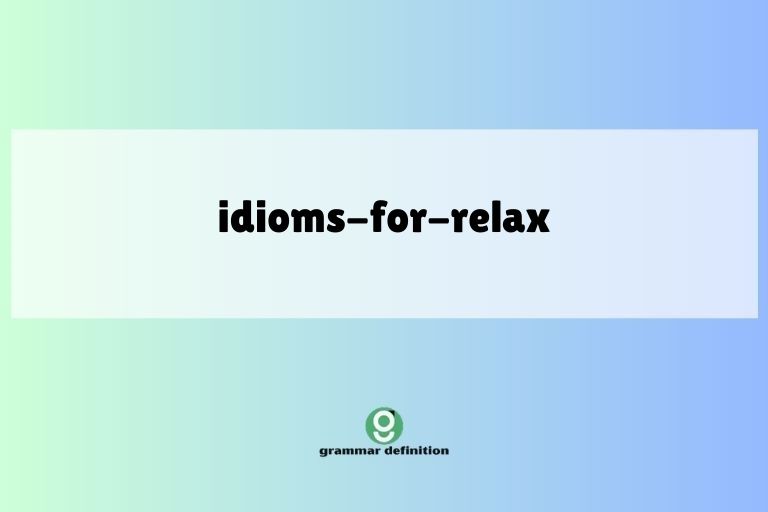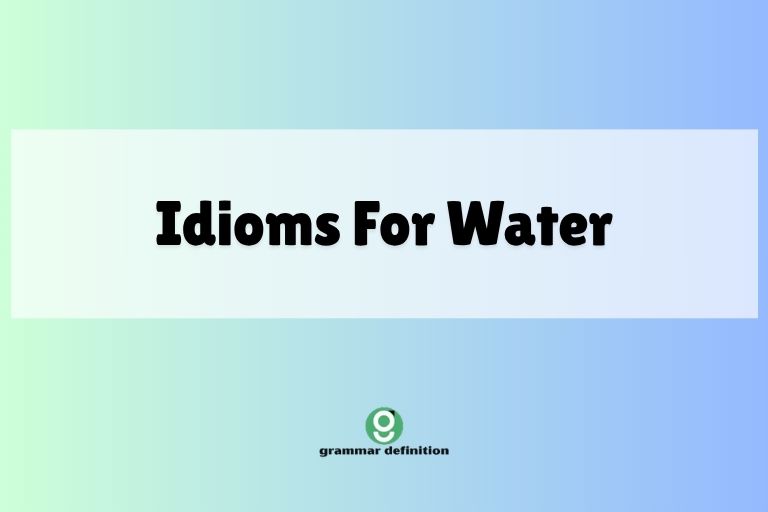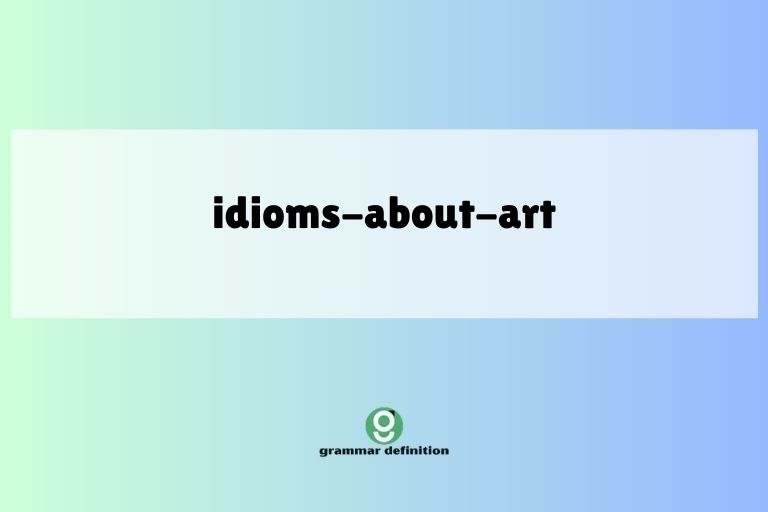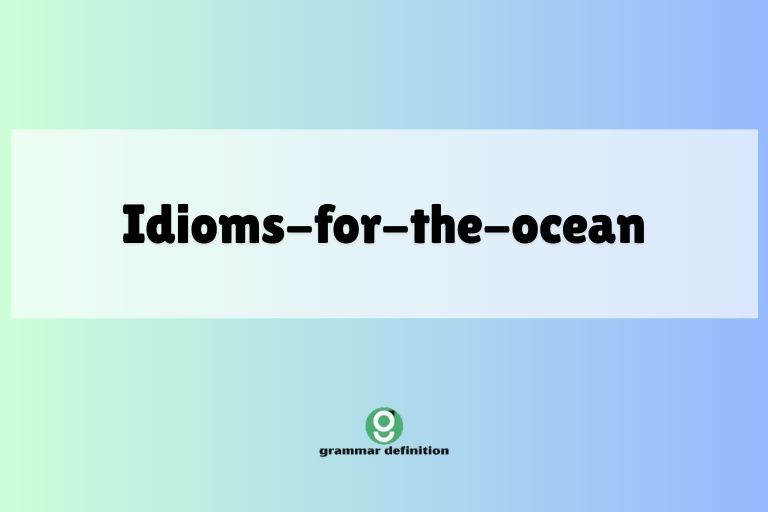Idioms for Relaxation: A Comprehensive Guide

Understanding idioms is crucial for mastering English, as they add color and depth to everyday language. Idioms related to relaxation are particularly useful for expressing feelings of calm, rest, and peace of mind.
This article provides a comprehensive guide to idioms about relaxation, explaining their meanings, origins, and usage. This guide is perfect for English language learners, teachers, and anyone interested in expanding their vocabulary and improving their fluency.
Table of Contents
- Introduction
- Definition of Idioms for Relaxation
- Structural Breakdown of Idioms
- Types and Categories of Relaxation Idioms
- Examples of Idioms for Relaxation
- Usage Rules for Relaxation Idioms
- Common Mistakes with Relaxation Idioms
- Practice Exercises
- Advanced Topics in Relaxation Idioms
- Frequently Asked Questions
- Conclusion
Introduction
Idioms are phrases or expressions whose meanings cannot be understood from the literal definitions of the words they contain. They are a vital part of the English language, enriching conversations and writing with colorful imagery and nuanced meaning.
Mastering idioms, especially those related to relaxation, allows you to express feelings of calmness and tranquility more effectively. This article explores various idioms related to relaxation, providing definitions, examples, and usage guidelines.
Whether you’re an English language learner or a native speaker, understanding these idioms can significantly enhance your communication skills.
Definition of Idioms for Relaxation
Idioms for relaxation are phrases that describe a state of calmness, peace, or rest. These idioms often use figurative language to convey the feeling of being relaxed or the act of relaxing.
Understanding these idioms requires recognizing that their overall meaning differs from the literal interpretation of the individual words. These idioms can describe both physical and mental relaxation, offering a wide range of expressions to choose from.
Classification: Idioms for relaxation fall under the broader category of figurative language. They can be further classified based on the specific type of relaxation they describe, such as physical rest, mental peace, or stress relief.
Function: The primary function of these idioms is to express feelings and concepts related to relaxation in a vivid and engaging manner. They add color and depth to communication, making it more expressive and relatable.
Contexts: These idioms are used in various contexts, including casual conversations, formal writing, and professional settings. The choice of idiom often depends on the specific situation and the desired level of formality.
Structural Breakdown of Idioms
Idioms are unique in their structure, as their meaning is not derived from the literal interpretation of their constituent words. Understanding the structural elements of idioms helps in recognizing and using them correctly.
Most idioms consist of a combination of nouns, verbs, adjectives, and prepositions, arranged in a specific order.
Common Patterns: Many idioms follow specific patterns, such as “verb + preposition,” “adjective + noun,” or “noun + verb.” Recognizing these patterns can help you identify and understand new idioms more easily.
Figurative Language: Idioms often employ figurative language, such as metaphors, similes, and personification, to create vivid imagery and convey their meaning. Understanding these figures of speech is essential for interpreting idioms correctly.
Non-Compositionality: A key characteristic of idioms is their non-compositionality, meaning that the overall meaning of the idiom is not simply the sum of the meanings of its individual words. This is what distinguishes idioms from literal phrases.
Types and Categories of Relaxation Idioms
Idioms for relaxation can be categorized based on the type of relaxation they describe:
Physical Relaxation
These idioms describe the act of resting or relaxing the body. They often involve phrases related to sleep, comfort, and physical ease.
Mental Relaxation
These idioms focus on calming the mind and reducing stress. They often involve phrases related to peace, tranquility, and mental clarity.
Emotional Relaxation
These idioms describe the release of emotional tension and the attainment of emotional peace. They often involve phrases related to happiness, contentment, and emotional stability.
Stress Relief
These idioms describe activities or states that alleviate stress and promote relaxation. They often involve phrases related to hobbies, leisure, and self-care.
Examples of Idioms for Relaxation
Here are several examples of idioms related to relaxation, categorized for clarity.
Idioms Related to Physical Relaxation
The following table provides examples of idioms related to physical relaxation. These idioms often describe the act of resting or relaxing the body.
| Idiom | Meaning | Example Sentence |
|---|---|---|
| Take it easy | Relax and not exert oneself | “You’ve been working hard; you need to take it easy this weekend.” |
| Kick back | Relax and enjoy oneself | “After a long day at work, I like to kick back and watch a movie.” |
| Put your feet up | Relax, especially by sitting or lying down with your feet supported | “Come in and put your feet up; you must be tired.” |
| Take a load off | Relax and relieve stress | “After carrying those heavy boxes, take a load off and have a seat.” |
| Take five | Take a short break | “We’ve been working non-stop; let’s take five and grab some coffee.” |
| Chill out | Relax and calm down | “Just chill out and don’t worry about the small stuff.” |
| Hang loose | Relax and stay calm, especially in a difficult situation | “Even though the project is behind schedule, just hang loose and we’ll figure it out.” |
| Unwind | Relax after a period of work or tension | “I like to unwind with a good book after a stressful day.” |
| Laze around | Relax and do nothing | “On Sundays, I like to laze around in my pajamas all day.” |
| Rest and recharge | Relax to regain energy | “I’m going on vacation to rest and recharge before starting the new project.” |
| Take a breather | Take a short break to relax or recover | “Let’s take a breather before we start the next set of exercises.” |
| Take time out | Take a break from one’s usual activities to relax | “I need to take some time out from work to focus on my health.” |
| Have a break | Take a short period of rest | “You’ve been studying for hours; have a break and stretch your legs.” |
| Loosen up | Relax and become less tense | “Before the presentation, try to loosen up and take a few deep breaths.” |
| Let your hair down | Relax and enjoy oneself | “After the exam, we’re going out to let our hair down and celebrate.” |
| Take a chill pill | Calm down and relax | “He needs to take a chill pill; he’s getting too worked up about this.” |
| Get horizontal | Lie down to relax | “I’m going to get horizontal for a while and read a book.” |
| Put your feet up and relax | Relax comfortably | “After a long day, there’s nothing better than putting your feet up and relax.” |
| Take a load off your feet | Sit down and relax | “Come in and take a load off your feet; you look exhausted.” |
| Lounge around | Relax in a lazy way | “We spent the afternoon lounging around by the pool.” |
| Take a siesta | Take a short nap, especially after lunch | “After a heavy meal, I like to take a siesta to recharge.” |
| Have a lie-down | Rest by lying down | “I’m feeling a bit tired; I think I’ll have a lie-down.” |
| Take a catnap | Have a short, light sleep | “I often take a catnap in the afternoon to boost my energy.” |
| Be on easy street | Live comfortably without worries | “After winning the lottery, they were finally on easy street.” |
| Have it easy | Have a relaxed and comfortable life | “He’s had it easy since he retired and moved to the countryside.” |
Idioms Related to Mental Relaxation
The following table provides examples of idioms related to mental relaxation. These idioms focus on calming the mind and reducing stress.
| Idiom | Meaning | Example Sentence |
|---|---|---|
| Clear your head | Relax and think clearly | “I went for a walk to clear my head after the stressful meeting.” |
| Put your mind at ease | Stop worrying and feel calm | “The doctor’s explanation put my mind at ease about the surgery.” |
| Take your mind off things | Distract yourself from worries | “Going to the movies helped me take my mind off things after the breakup.” |
| Get away from it all | Escape from stress and routine | “We decided to get away from it all and spend a week in the mountains.” |
| Switch off | Stop thinking about work or problems | “It’s important to switch off from work when you get home.” |
| Free up your mind | Relax and allow yourself to think creatively | “Meditating in the morning helps me free up my mind for the day.” |
| Let go of stress | Release tension and anxiety | “Yoga helps me let go of stress and feel more balanced.” |
| Find your peace | Discover inner calm and tranquility | “Spending time in nature helps me find my peace.” |
| Find your happy place | Imagine a place that makes you feel calm and content | “When I’m stressed, I close my eyes and find my happy place: a quiet beach.” |
| Be at peace | Feel calm and content | “After years of conflict, they were finally at peace with each other.” |
| Have peace of mind | Feel free from worry and anxiety | “Knowing that the children are safe gives me peace of mind.” |
| Be cool as a cucumber | Stay calm and composed, especially in a difficult situation | “Despite the chaos, she was as cool as a cucumber.” |
| Not turn a hair | Not show any emotion or concern | “He didn’t turn a hair when he heard the bad news.” |
| Keep your shirt on | Stay calm and don’t get angry | “Keep your shirt on; there’s no need to shout.” |
| Keep a level head | Remain calm and rational in a crisis | “It’s important to keep a level head in emergency situations.” |
| Keep your cool | Stay calm and composed | “Even when things go wrong, it’s important to keep your cool.” |
| Stay grounded | Remain calm and balanced, especially in stressful situations | “Practicing mindfulness helps me stay grounded.” |
| Stay centered | Maintain emotional and mental balance | “Yoga and meditation help me stay centered.” |
| Take a back seat | Reduce involvement or responsibility to relax | “I decided to take a back seat on this project to reduce my stress.” |
| Go with the flow | Accept events as they happen without resistance | “Sometimes it’s best to just go with the flow and not worry too much.” |
| Ride the wave | Deal with a situation as it unfolds, without overthinking | “The market is volatile, so we just have to ride the wave.” |
| Don’t sweat the small stuff | Don’t worry about minor issues | “Don’t sweat the small stuff; focus on what’s truly important.” |
| Let things slide | Ignore minor issues or mistakes | “Sometimes it’s better to let things slide to avoid unnecessary conflict.” |
Idioms Related to Stress Relief
The following table provides examples of idioms related to stress relief. These idioms describe activities or states that alleviate stress and promote relaxation.
| Idiom | Meaning | Example Sentence |
|---|---|---|
| Blow off steam | Release pent-up energy or frustration | “I went for a run to blow off steam after the argument.” |
| Get something off your chest | Express something that has been bothering you | “It helped to get everything off my chest and talk about my feelings.” |
| Take the edge off | Reduce tension or anxiety | “A glass of wine can take the edge off after a long day.” |
| Tune out | Ignore or stop paying attention to something stressful | “I like to tune out the news and focus on positive things.” |
| Escape the rat race | Leave a stressful and competitive lifestyle | “They decided to escape the rat race and move to the countryside.” |
| Get away | Go on vacation or take a break to relieve stress | “We need to get away for a weekend to recharge our batteries.” |
| Take a break from the grind | Take a break from hard work or routine | “It’s important to take a break from the grind and enjoy life.” |
| Take a step back | Evaluate a situation from a distance to reduce stress | “Sometimes you need to take a step back and see the bigger picture.” |
| Take a vacation | Go on a trip to relax and enjoy | “We’re planning to take a vacation to Hawaii next year.” |
| Go on a retreat | Attend a program for relaxation and self-reflection | “She went on a yoga retreat to de-stress and recharge.” |
| Have a change of scenery | Experience a new environment to refresh your mind | “A change of scenery can do wonders for your mental health.” |
| Pamper yourself | Indulge in activities that make you feel good | “I like to pamper myself with a spa day every once in a while.” |
| Treat yourself | Do something special for yourself to feel good | “After finishing the project, I’m going to treat myself to a nice dinner.” |
| Indulge in a hobby | Engage in a relaxing activity you enjoy | “I like to indulge in my hobby of painting to relax.” |
| Get lost in a good book | Become engrossed in reading to escape stress | “I love to get lost in a good book on a rainy day.” |
| Listen to soothing music | Relax by listening to calming sounds | “I find it helpful to listen to soothing music before bed.” |
| Practice mindfulness | Focus on the present moment to reduce stress | “Practicing mindfulness helps me stay calm and centered.” |
| Meditate | Engage in meditation to calm the mind | “I meditate every morning to start my day with a clear mind.” |
| Do yoga | Practice yoga for physical and mental relaxation | “I do yoga three times a week to stay fit and relaxed.” |
| Take a walk in nature | Relax by spending time outdoors | “I love to take a walk in nature to clear my head.” |
Usage Rules for Relaxation Idioms
Using idioms correctly requires understanding their specific meanings and contexts. Here are some general rules to follow when using idioms related to relaxation:
Context: Consider the context of the conversation or writing. Some idioms are more appropriate for casual settings, while others are suitable for formal situations.
Audience: Be aware of your audience. Some idioms may not be familiar to non-native speakers or people from different cultural backgrounds.
Grammar: Pay attention to the grammatical structure of idioms. Do not change the words or word order, as this can alter their meaning or make them nonsensical.
Tense and Number: Adapt the tense and number of the words within the idiom to fit the sentence, but without changing the core wording of the idiom itself. For example, you can say “He is taking it easy” or “They took it easy yesterday.”
Avoid Overuse: While idioms can add color to your language, overuse can make your writing or speech sound unnatural or forced. Use them sparingly and appropriately.
Common Mistakes with Relaxation Idioms
Here are some common mistakes people make when using idioms related to relaxation:
Literal Interpretation: Interpreting idioms literally instead of understanding their figurative meaning is a common mistake. For example, interpreting “take a chill pill” as actually taking a pill instead of calming down.
Incorrect Word Order: Changing the word order of an idiom can alter its meaning or make it nonsensical. For example, saying “easy take it” instead of “take it easy.”
Mixing Up Idioms: Confusing one idiom with another can lead to miscommunication. For example, saying “put your head at ease” instead of “put your mind at ease.”
Overusing Idioms: Using too many idioms in a single conversation or piece of writing can make your language sound unnatural and contrived.
Incorrect Tense or Form: Not adjusting the tense or form of the words within the idiom correctly can lead to grammatical errors. For example, saying “He take it easy” instead of “He takes it easy.”
Examples of Correct vs. Incorrect Usage:
| Incorrect | Correct | Explanation |
|---|---|---|
| “Relax your head.” | “Clear your head.” | “Clear your head” means to relax and think clearly. |
| “Put your head at ease.” | “Put your mind at ease.” | “Put your mind at ease” means to stop worrying and feel calm. |
| “Take it slowly.” | “Take it easy.” | “Take it easy” means to relax and not exert oneself. |
| “Hang tight.” | “Hang loose.” | “Hang loose” means to relax and stay calm. |
Practice Exercises
Test your understanding of idioms for relaxation with these exercises.
Exercise 1: Fill in the Blanks
Fill in the blanks with the correct idiom from the list below.
Idiom List: take it easy, kick back, put your feet up, take a load off, chill out, unwind, blow off steam, clear your head, get away from it all, switch off
| Question | Answer |
|---|---|
| 1. After a long week at work, I just want to ________ and watch some TV. | kick back |
| 2. You look stressed; you need to ________ and stop worrying so much. | chill out |
| 3. I’m going for a run to ________ after that frustrating meeting. | blow off steam |
| 4. Come in and ________; you must be tired after all that traveling. | put your feet up |
| 5. You’ve been working too hard; you need to ________ this weekend. | take it easy |
| 6. I like to ________ with a good book before going to bed. | unwind |
| 7. Let’s ________ and go on vacation to the beach. | get away from it all |
| 8. I need to ________ from work when I get home so I can relax. | switch off |
| 9. After carrying those heavy boxes, ________ and have a seat. | take a load off |
| 10. I went for a walk in the park to ________. | clear my head |
Exercise 2: Matching
Match the idiom to its meaning.
| Idiom | Meaning |
|---|---|
| 1. Take a chill pill | A. Escape from stress and routine |
| 2. Get away from it all | B. Relax and enjoy oneself |
| 3. Let your hair down | C. Stop thinking about work or problems |
| 4. Switch off | D. Calm down and relax |
| 5. Take the edge off | E. Reduce tension or anxiety |
Answers:
1-D, 2-A, 3-B, 4-C, 5-E
Exercise 3: Multiple Choice
Choose the correct meaning of the idiom in the sentence.
| Question | Options | Answer |
|---|---|---|
| 1. After the stressful day, I just want to laze around. | A. Work hard, B. Relax and do nothing, C. Go for a run | B. Relax and do nothing |
| 2. He told me to keep my shirt on when I started to get angry. | A. Take off my shirt, B. Stay calm, C. Get dressed | B. Stay calm |
| 3. We decided to go with the flow and see what happens. | A. Resist changes, B. Accept events without resistance, C. Plan everything carefully | B. Accept events without resistance |
| 4. She needs to blow off steam after the argument. | A. Bottle up her feelings, B. Release pent-up energy, C. Ignore the problem | B. Release pent-up energy |
| 5. It’s time to take a breather before we start the next task. | A. Work non-stop, B. Take a short break, C. Give up | B. Take a short break |
Advanced Topics in Relaxation Idioms
For advanced learners, understanding the nuances and origins of idioms can further enhance their language skills.
Etymology: Exploring the etymology of idioms can provide insights into their historical and cultural context. For example, the idiom “cool as a cucumber” dates back to the 17th century and refers to the cucumber’s ability to remain cool even in warm weather.
Regional Variations: Some idioms may have regional variations in meaning or usage. Being aware of these variations can help you avoid misunderstandings when communicating with people from different regions.
Figurative Language Analysis: Analyzing the figurative language used in idioms can deepen your understanding of their meaning and impact. Identifying metaphors, similes, and other figures of speech can help you appreciate the creativity and expressiveness of idioms.
Frequently Asked Questions
Here are some frequently asked questions about idioms for relaxation:
Q1: What is an idiom?
A1: An idiom is a phrase or expression whose meaning cannot be understood from the literal definitions of the words it contains. It is a figurative expression that has a specific meaning known to native speakers of the language.
Q2: Why are idioms important in English?
A2: Idioms are important because they add color, depth, and nuance to the English language. They allow speakers to express complex ideas and emotions in a concise and engaging manner. Understanding idioms is crucial for effective communication and fluency in English.
Q3: How can I learn idioms effectively?
A3: You can learn idioms effectively by reading widely, listening to native speakers, and practicing using idioms in your own speech and writing. It’s also helpful to keep a notebook of new idioms and review them regularly. Contextual learning, where you understand the idiom in a sentence, is key.
Q4: Are idioms the same in all English-speaking countries?
A4: No, idioms can vary between different English-speaking countries and regions. Some idioms may be specific to certain areas, while others may have different meanings or connotations in different regions. Being aware of these regional variations is important for avoiding misunderstandings.
Q5: How do I avoid misusing idioms?
A5: To avoid misusing idioms, make sure you understand their specific meaning and context. Pay attention to the grammatical structure of idioms and avoid changing the words or word order. Also, be mindful of your audience and avoid using idioms that may be unfamiliar to them.
Q6: Can I translate idioms directly from my native language into English?
A6: No, you cannot usually translate idioms directly from your native language into English. Idioms are often language-specific, and a direct translation may not make sense or have the same meaning in English. It’s best to learn idioms as individual expressions rather than trying to translate them.
Q7: How often should I use idioms in my speech and writing?
A7: While idioms can enhance your language skills, it’s important to use them sparingly and appropriately. Overusing idioms can make your speech or writing sound unnatural or forced. Use them when they add value to your communication and avoid using them just for the sake of using them.
Q8: Are there any resources that can help me learn idioms?
A8: Yes, there are many resources available to help you learn idioms, including dictionaries, textbooks, websites, and language learning apps. Look for resources that provide definitions, examples, and practice exercises to help you master idioms effectively.
Conclusion
Mastering idioms related to relaxation is a valuable skill for English language learners and native speakers alike. These idioms add color and depth to your communication, allowing you to express feelings of calmness, peace, and rest more effectively.
By understanding the definitions, usage rules, and common mistakes associated with these idioms, you can enhance your fluency and communicate more confidently in English.
Remember to practice using these idioms in your own speech and writing to reinforce your learning. Pay attention to the context and audience when using idioms, and avoid overusing them.
With consistent effort and practice, you can master idioms for relaxation and elevate your English language skills to the next level. Keep exploring and expanding your vocabulary to continue improving your communication skills.






